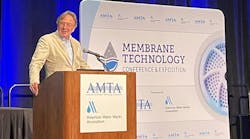Dec. 20, 2011 -- Researchers have found that water discharged into lakes and rivers from municipal sewage treatment plants may contain significant concentrations of the genes that make bacteria antibiotic-resistant. That's the conclusion of a new study on a sewage treatment plant on Lake Superior in the Duluth, Minn., harbor.
Timothy M. LaPara and colleagues explain that antibiotic-resistant bacteria -- a major problem in medicine today -- are abundant in the sewage that enters municipal wastewater treatment plants. Treatment is intended to kill the bacteria, and it removes many of the bacterial genes that cause antibiotic resistance. However, genes or bacteria may be released in effluent from the plant. In an effort to determine the importance of municipal sewage treatment plants as sources of antibiotic resistance genes, the scientists studied releases of those genes at the Duluth facility.
Although the Duluth facility uses some of the most advanced technology for cleaning wastewater -- so-called tertiary treatment -- the study identified it as an important source of antibiotic resistance genes. Sampling of water at 13 locations detected three genes, for instance, that make bacteria resistant to the tetracycline group of antibiotics, which are used to treat conditions ranging from acne to sexually transmitted diseases to anthrax and bubonic plague. LaPara's team says their research demonstrates that even the most high-tech sewage treatment plants may be significant sources of antibiotic resistance genes in waterways.
The Duluth sewage treatment plant study appears in ACS' journal Environmental Science & Technology. The authors acknowledge funding from the National Science Foundation and the Minnesota Environment and Natural Resources Trust Fund.
The American Chemical Society is a non-profit organization chartered by the U.S. Congress. With more than 163,000 members, ACS is the world's largest scientific society and a global leader in providing access to chemistry-related research through its multiple databases, peer-reviewed journals and scientific conferences. Its main offices are in Washington, D.C., and Columbus, Ohio.
###


